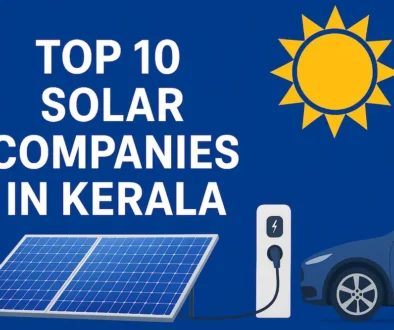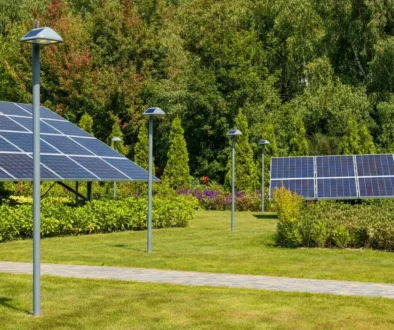Rooftop Solar in Kerala: New Regulations, Consumer Concerns, and What It Means for You
Rooftop solar panels have long been hailed as a sustainable and cost-effective way for Kerala residents to cut their electricity bills and reduce their carbon footprint. Over the years, tens of thousands of households in the state have turned to solar energy, benefiting from the net metering system and various government incentives.
However, new draft regulations proposed by the Kerala State Electricity Regulatory Commission (KSERC) are stirring confusion and concern among consumers (those who both consume and produce solar power). These changes, which include a cap on net metering and a call for better energy storage, could have a significant impact on current and future solar users in Kerala.

What Are the New Rooftop Solar Regulations in Kerala
The draft regulations, introduced by the KSERC in July 2025, aim to address what the Kerala State Electricity Board (KSEB) sees as imbalances caused by the rapid rise in solar power production. According to the KSEB:
- Over 70% of solar energy generated during the daytime is being exported to the grid.
- This excess energy is causing disruptions in scheduled power purchases.
- The benefits gained by around 2 lakh consumers are reportedly coming at the cost of 1.4 crore other electricity consumers.
To address these concerns, the new draft includes the following key proposals:
1. Limiting Net Metering to 3 kW
Net metering allows consumers to feed excess electricity generated by their rooftop solar systems back into the grid and receive a credit. Under the new proposal, net metering will be restricted to solar systems up to 3 kW.
2. Encouraging Energy Storage Solutions
Instead of relying on the grid to absorb excess energy, the draft suggests promoting battery storage solutions, allowing consumers to store and use their energy during non-solar hours.
3. Exploring Peer-to-Peer (P2P) Energy Trading
The KSERC is also exploring innovative solutions like peer-to-peer (P2P) energy trading, where energy can be shared or sold directly between consumers without burdening the grid.
4. Potential Cost Ceiling for Solar Installation
During public hearings, there was also a demand for the commission to set a ceiling on the cost of solar plant installations to protect consumers from overpricing.
What Are Consumers Saying
Consumers across Kerala are voicing strong opposition to the proposed limitations. Many invested in larger capacity systems (5 kW and above) to maximize their savings through net metering. Now, a restriction to 3 kW could reduce the economic viability of their systems and delay their return on investment.
Concerns Raised Include:
- Higher electricity bills if excess energy can’t be exported.
- Additional expenses if battery storage becomes mandatory.
- Uncertainty over the future of their solar investments.
What Do the KSEB Employees and Unions Say
Interestingly, employee unions in the KSEB have welcomed the draft regulations. Both Left and Congress-backed unions argue that the proposals are necessary to balance the grid and protect all consumers.
They believe:
- The solar boom in Kerala has created challenges for power distribution.
- Current consumers’ benefits may be indirectly subsidized by other consumers.
- The system needs to evolve with storage and smarter technologies.
Unions have also acknowledged the need to correct the misinformation that these regulations are entirely against consumers. They suggest the draft should be viewed as an opportunity for system-wide improvement.
Why Are These Changes Happening Now
The reason behind the urgency is clear: Kerala’s solar power capacity has increased by a whopping 275% in the last two years. While this is excellent news for sustainability, it creates technical and financial challenges:
- The grid is not built to absorb such high levels of unplanned, decentralized energy.
- Power purchase agreements made in advance by the KSEB may go to waste if solar energy floods the grid during the day.
- This can lead to revenue loss for the board and higher tariffs for non-solar users.
Whether you are already a solar user or planning to install a system soon, here’s what you need to know:
If You are a Consumer (Have Solar Installed)
- Your current system and benefits may continue under a grandfather clause—but this has not been confirmed yet.
- If you have more than 3 kW installed, you might lose the ability to net-meter any excess capacity.
- You may need to consider installing a battery to store excess energy.
If You are Planning to Go Solar
- The 3 kW net metering cap could affect how much of your electricity bill you can offset.
- The return on investment may vary based on your usage and whether you can store your energy.
- It’s more important than ever to consult with a trusted solar company before investing.
How Solar Master Supports You Through These Changes
At Solar Master, we understand how confusing and worrying these policy shifts can be. That’s why we’re committed to educating, supporting, and empowering our customers every step of the way.
Here’s how we help:
Expert Consultation
We stay up to date with the latest KSERC guidelines and help you plan a solar system that fits your needs and complies with regulations.
Scalable Systems
Our solar solutions are modular and future-proof. Whether it’s 3 kW or 10 kW, we build systems that can adapt to changing laws.
Battery Storage Solutions
We offer the latest lithium battery-based storage options to ensure you use every unit of energy you produce.
Affordable Pricing and Transparent Quotes
With rising demand for price caps, we ensure that our pricing is transparent, affordable, and fair.
Maintenance and Monitoring
We don’t disappear after installation. We provide ongoing maintenance and real-time monitoring tools, so your system always performs at its best.
Solar is Still the Future – Let’s Do It Right
The new regulations may feel like a setback, but they also open up new avenues for smarter energy use, storage, and management. Kerala is at the forefront of India’s solar revolution, and with the right partners like Solar Master, you can still enjoy massive benefits from going green.
We urge policymakers to balance the needs of consumers, the grid, and future energy goals, and we urge consumers to stay informed and proactive.
The sun hasn’t stopped shining. Neither should your savings.
FAQs
Keep Your Panels Shining! Want more power and longer life from your solar system?





